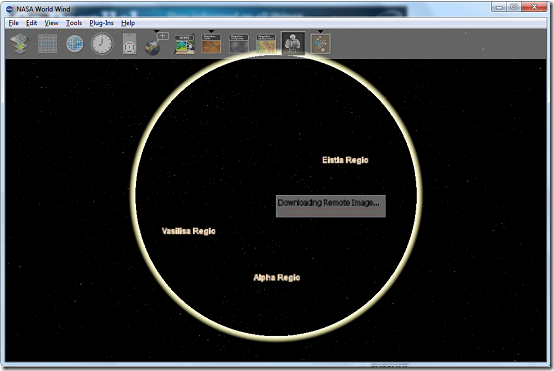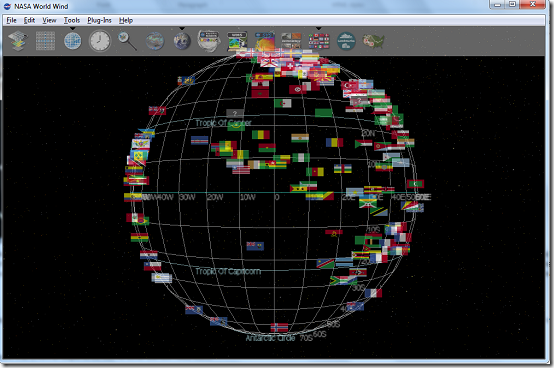NASA World Wind is an open source program that lets you see the map of the Earth by zooming from satellite altitude. The software lets you visit any place on earth on 3D from the comfort of your computer.
Features
The 3D Engine allows users to zoom on any place on earth from a satellite by leveraging high-resolution LandSat 7 imagery and elevation data from SRTM. The 3D engine has been made very easy to use to make it accessible to everyone. One can control the whole application with just two mouse buttons.
Blue Marble which is a true colour image of the earth from the NASA Observatory has been used in the application. Coupled with data from various satellites, the Blue Marble can be clearly seen at a resolution of 1km per pixel.
Check out Celestia a free software to explore stars, galaxies, and thousands of planets.
Once you zoom past the Blue Marble, LandSat 7 provides a seamless mosaic which is very detailed. LandSat 7 consist of images of an astounding 15m per pixel resolution shot in a period of 4 years between 1999 and 2003. Users can easily browse through these pictures and you do not have to worry about updates which are automatically downloaded to the program. Boasting of this impressive resolution, LandSat 7 allows you to view your location and many other things in the vicinity. The program also keeps a compressed copy of any LandSat 7 images you have viewed in case you need to refer them later.
Shuttle Radar Topography Mission (SMRT) data is combined with LandSat 7 images used to create an awesome view of the Earth. It also enables users to quickly move from one position of the earth to another in any direction.
Animations created by Goddard Space Flight Centre (GSFC) are able to replicate phenomenon like hurricanes and other seasonal changes occurring all around the world. These animations are integrated into World Wind and can be easily painted of any area of the world experiencing such events to view map of the Earth right from your PC.
Moderate Resolution Imaging Spectrometer (MODIS) produces data updated on a daily basis. MODIS keeps a records of fires, storms, dust, smoke and volcanic activity which are colour coded onto the globe. Images are then published at a resolution of 250m per pixel and are updated on a daily basis.
Place names contains a database of all cities, towns, counties, capitals and important landmarks. The names of these items populate the image dynamically as you continue to zoom in on your desired location. Visual tools allow users to experience features such as longitude, latitudes and other coordinates. Landmark sets allow the user to view actual 3D models of important landmarks.
You can also check out Marble free software which offers different style maps.
How to use it to view Map of the Earth
The interface is intuitive and very simple.
Viewing angles are changed by dragging the right mouse key or using the combination of alternate gaming keys, W, A, S and D. Zooming can be done via the mouse wheel or by the numeric keys 7 and 1 for zooming in and out respectively. Views are rested by the spacebar or the number 5 key. Angles of elevation can be manipulated by using any of the numeric keys from 1 to 10 and zero for no elevation. Functions are mapped as hotkeys for many of the common functions like location search, longitude and latitude views, position information and scientific visualization studio. Users also have a chance to view other planets besides the earth. Images are available for Jupiter, Venus, Mars and the Moon.
Opinion
The program is quite impressive as you can watch Map of the Earth and praise the creation of nature. However, all is not well, it consumes quite an amount of system memory and requires very good internet connection to get all pictures and data for viewing.
Verdict
NASA World Wind is a great software that offers an experience like no other but still needs work.

